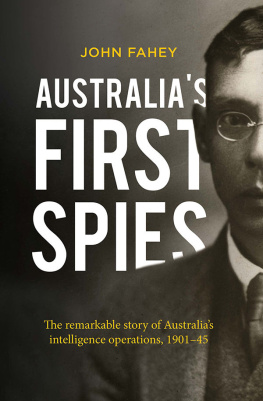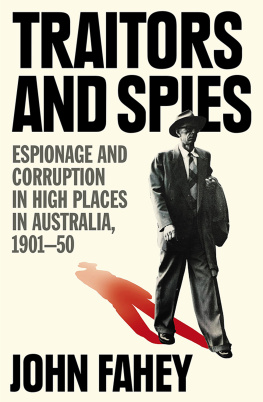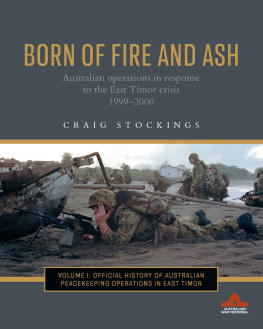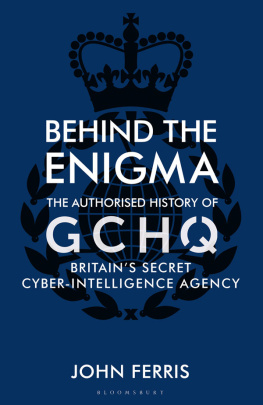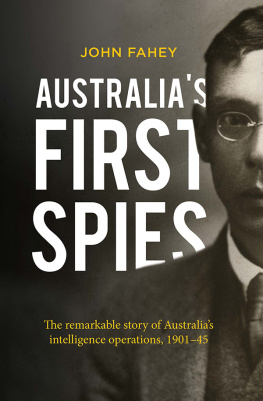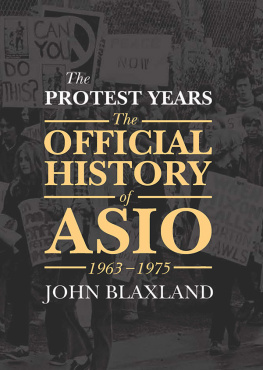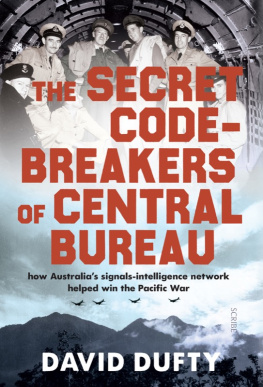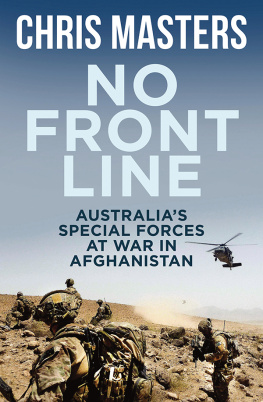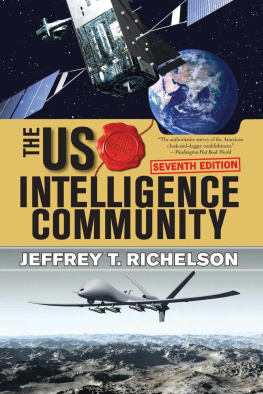DR JOHN FAHEY worked at Defence Signals Directorate (19881996) and served in a number of regimental and intelligence postings during his service in the British and Australian armies between 1975 and 2014. He is currently an Honorary Fellow of the Department of Security Studies and Criminology at Macquarie University, and managing director of Cynergex Group, a medical education and services company.
* * *
The remarkable story of how, beginning at Federation, Australia developed its own foreign intelligence institutions. Based on thorough research, it is a comprehensive account that draws on the authors own deep understanding of how intelligence organisations should be run. It is also a warning tale that emphasises that Australia needs to put its own interests first, and that intelligence work requires hard-headed professionals, backed by an informed and responsible government. It fills a major gap in the history of Australian intelligence organisations.
Professor David Horner, author of The Spy Catchers:
The Official History of ASIO 19491963
Great intelligence is often shared by great story telling, and John Fahey shares a great story in Australias First Spies. This book should be a foundational reference for every Indo-Pacific intelligence professional and historian. Just as great intelligence provides value by adding context to raw information, John Fahey adds context to events and brings to life many Australian trailblazers whose fiercely independent all-source intelligence operations established a culture of excellence that carries on today. Ive benefitted from Australian intelligence in peace, crisis and combatI now have a better understanding of the foundation that makes it so good.
Rear Admiral Paul Becker, USN (Retired), Former Director for
Intelligence of the US Pacific Command and Joint Chiefs of Staff

A photograph of the first Japanese air raid on Australian-controlled territory, taken at lunchtime on 9 December 1941, the day after the attack on Pearl Harbor. The photograph was taken by Bridget Tothill from her home on Nauru.

First published in 2018
Copyright John Fahey 2018
All rights reserved. No part of this book may be reproduced or transmitted in any form or by any means, electronic or mechanical, including photocopying, recording or by any information storage and retrieval system, without prior permission in writing from the publisher. The Australian Copyright Act 1968 (the Act) allows a maximum of one chapter or 10 per cent of this book, whichever is the greater, to be photocopied by any educational institution for its educational purposes provided that the educational institution (or body that administers it) has given a remuneration notice to the Copyright Agency (Australia) under the Act.
Allen & Unwin
83 Alexander Street
Crows Nest NSW 2065
Australia
Phone: (61 2) 8425 0100
Email:
Web: www.allenandunwin.com

ISBN 978 1 76063 120 8
eISBN 978 1 76063 659 3
Maps by Keith Mitchell
Photograph on p. ii: Diary of Bridget Tothill, National Archives of Australia, MP 1174/1, 1122.
Index by Garry Cousins
Set by Midland Typesetters, Australia
Cover design: Julia Eim
Cover photo: Harry Freame, c. 1920. Goodyear Family Collection, courtesy of Sheila Spence
Never let any government imagine that it can choose perfectly safe courses; rather let it expect to have to take very doubtful ones, because it is found in ordinary affairs that one never seeks to avoid one trouble without running into another; but prudence consists in knowing how to distinguish the character of troubles; and for choice to take the lesser evil.
Niccol Machiavelli, The Prince (trans. 1908)
CONTENTS
The idea for this book arose out of a conversation with an old colleague, Captain Fred Smith, US Navy (retired), about the lack of good research on Australias intelligence operations prior to the end of World War II. A British colleague who was present quipped that the proposed book would be the worlds shortest. This challenge could not be overlooked, and so Australias First Spies was born.
Australias First Spies is the history of the practical steps Australia took to exercise control over its national interests immediately the nation was formed on 1 January 1901 until the end of 1945. The starting point of our story, 1 January 1901, is obvious because Australia was declared a unified nation on that day. What is not so well known is that the creation of the Commonwealth of Australia entailed the first ever transfer of responsibility for the management of foreign relationships from the Parliament of Westminster to another parliament of the Empire. Within a few months, Australias government would take action to protect the countrys interests by launching Australias first ever clandestine intelligence operation against France and Britain in the New Hebrides.
There are four reasons for ending Australias First Spies in 1945. The first is that the defeat of Japan in August 1945 marked the end of the first fundamental threat Australia had to fight off, and intelligence operations contributed to that victory. The second is that 1945 marked both a highpoint in Australias intelligence capability and, with the onset of peace, the very real risk that Australian government complacency would lead to the destruction of the whole intelligence apparatus that had been so carefully nurtured since 1901. The third reason is that 1945 saw our enemys enemy return to being our enemy and we now had to defend the nation from the machinations of the Soviet Unions hostile intelligence services. The final reason is more prosaic, in that in 1946 the first moves were made to create the Defence Signals Bureau, the predecessor of my old employer, Defence Signals Directorate, and the Australian Security Intelligence Organisation to protect it. My subsequent career in government allowed me a little access to some of this story and, as I promised never to reveal anything to which I had access, Australias First Spies needs to end in 1945.
The purposes of this book are straightforward. The first purpose is to provide the specialist reader with a well-researched history of Australias early intelligence operations and to, hopefully, provide the general reader with a readable book that tells the story of our nations early intelligence operations. The second purpose is to show how the secret history of a country is a far more dependable indicator of what actually happened than all of the public pronouncements and posturing of politicians and appointed officials. Australias First Spies is a book that pays less attention to what was said in favour of closely examining and describing what was done.
As such, Australias First Spies challenges the idea that Australias early governments sacrificed Australian self-interest in favour of Britain. As the reader will see below, the evidence clearly shows that Australias governments looked first to protect Australias national interests and only supported British self-interest when it coincided with Australias self-interest. When Australias self-interest was put at risk by British self-interest, as it was in the New Hebrides in 1901, Australias leaders were Machiavellian enough to launch a clandestine spying operation on Britain and France. This operation clearly shows that Australias leaders were self-interested men who instinctively understood the primacy of self-interest in all foreign relationships as articulated by Lord Palmerston in his famous description: We have no eternal allies, and we have no perpetual enemies. Our interests are eternal and perpetual, and those interests it is our duty to follow.

